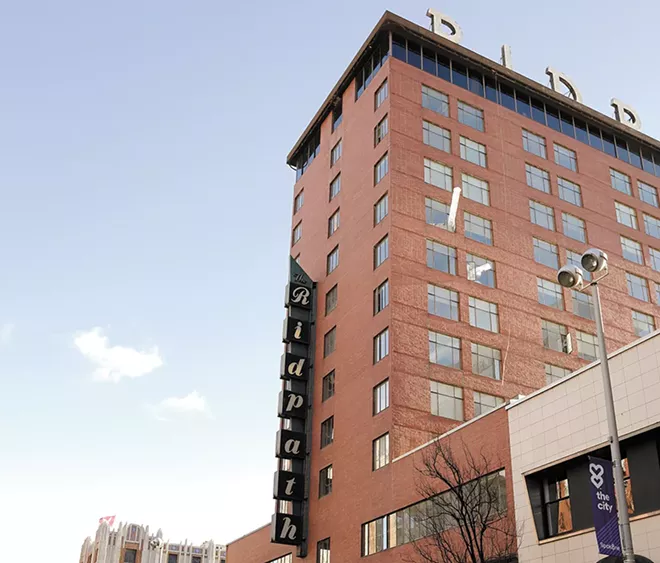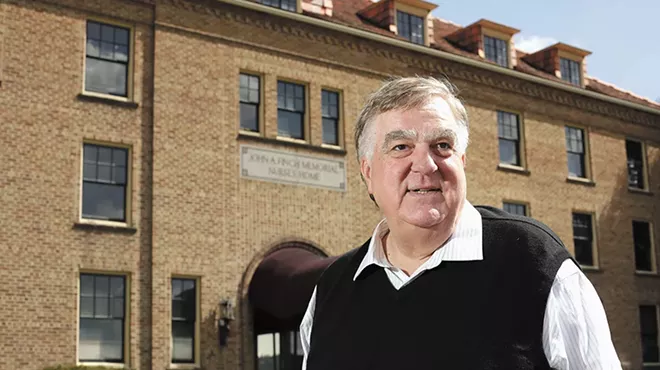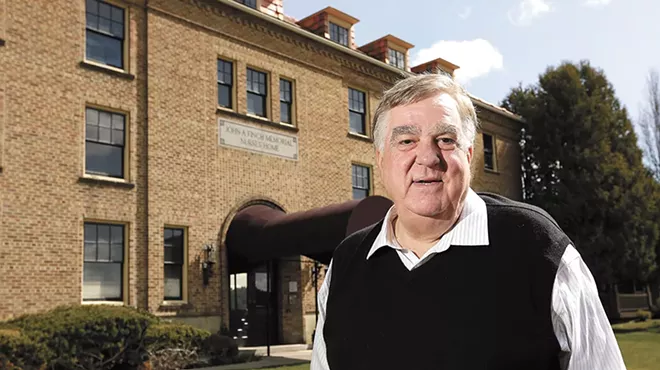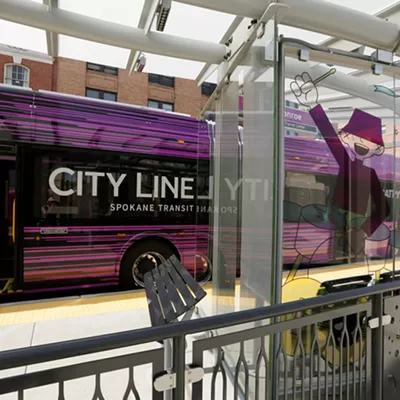One wouldn't exactly describe the exterior of the Ridpath — the beat-up hotel in downtown Spokane that's being renovated into apartments — as vibrant or appealing. You're more likely to notice boarded-up storefronts, a broken window and sporadic graffiti strewn across the street-level walls.
But inside the dreary 68-year-old building, tenants describe an affordable and liveable home with well furnished and modern units that they enjoy.
"I've lived in here since they opened. I was one of the first people to get approved," John Lemus, a resident since last April, tells the Inlander while standing outside the Sprague Avenue building entrance. "I have a micro studio. I love it. I'm really proud to live here."
"It's really nice," says Ian Larsen, a tenant in a
Larsen and Lemus were some of the first tenants to move into the building when its management started leasing units last spring, despite the fact that construction was still ongoing. At the time, the repurposing of the iconic Spokane building seemed to be on track after years of false starts since the former hotel closed in 2008.
Now, however, the project is back in the news under less-than-ideal circumstances. The chief visionary behind the project, well-known local developer Ron Wells, is facing a federal indictment, health problems and has been ousted from his leadership role by Ridpath investors. This, coupled with other issues, has prompted some stakeholders to wonder if the promise of a renovated Ridpath can be achieved.
None more so than the people who live there. Their enthusiasm for the project is tempered with a variety of security-related issues ranging from aggressive confrontations with people loitering outside the building to assaults and other disturbances.
"
Nevertheless, the Ridpath's management team has been relatively successful in filling units in the building, and construction is almost complete, according to Paul Mann, a co-investor in the project. Of the 151 units in the main building, 120 are filled, and leasing will begin soon on the other 55 in the adjacent Y Building, which is also part of the complex. Roughly 80 percent of the total 206 units will be affordable. "We're 95 percent done. It's a matter of a few weeks," Mann says of the construction process, adding that they expect to be at maximum occupancy by spring.
In mid-December, Wells, who had shepherded the project as its developer for the past six years, was indicted in federal court on 17 counts related to a complex insurance fraud scheme. (Wells is also reportedly recovering in a rehabilitation facility after going into a three-week medically induced coma following a surgery a few months ago.) The criminal charges stand in sharp contrast to Wells' reputation as a civic pioneer who took control of the Ridpath and promised to bring vitality to that part of downtown.
The push for revamping the 13-floor former high-end hotel located on Sprague between Stevens and Howard streets has been a long time coming. Since going out of business roughly a decade ago, the building has been associated with urban blight in downtown Spokane due to vandalism and squatting in the vacant structure.
In 2012, Wells stepped in, offering up development plans that would make contemporary urban planners drool: He wanted to convert the dilapidated vintage structure into
Following years of legal tussles over ownership of the building, in 2017, Wells secured a $1.75 million investment from the city of Spokane in leftover funds from a federal housing program to help subsidize the low-income units. Construction on the project was repeatedly delayed — the building was once expected to open in the fall of 2017 — but by the spring of 2018, some of the units were getting leased. Meanwhile, local restaurant entrepreneur Jeremy Hansen was working on a gin-focused bar and restaurant in the vacant ground-level commercial space facing Sprague.
To the broader community, the project was pitched as a way to revitalize a downtrodden portion of downtown and provide desperately needed affordable housing in the city's urban core. "They were supposed to have some retail and a restaurant and another little bar. It was supposed to be a mixed-use cool space with some apartments that I thought were going to add to our community," says Tyson Sicilia, owner of the Observatory bar adjacent to the Ridpath building.
However, the Jane Jacobs-
According to data provided by John O'Brien, a spokesman for the Spokane Police Department, a large number of calls stem from the Ridpath. Between Jan. 1 and Dec. 31 of 2018, the department logged 94 incidents ranging from assaults to graffiti, and a month-to-month breakdown also shows the number of incidents spiking during the summer months, shortly after the time when the Ridpath started leasing its first units. In comparison, the Metropolitan Apartments on North Bernard Street, just blocks away, only garnered five incident during the same time period, while the M Apartments next to River Park Square logged three.
David Singley, police captain of the downtown precinct, says that the block was a high-activity area even before the Ridpath opened. He places most of the incidents occurring on the corner of Sprague and Howard outside of a small corner store called Downtown Groceries. He writes in an email that the concentration is "frequently" related to "groups congregating on the sidewalks at that intersection" and that incidents spike in the spring and summer months.
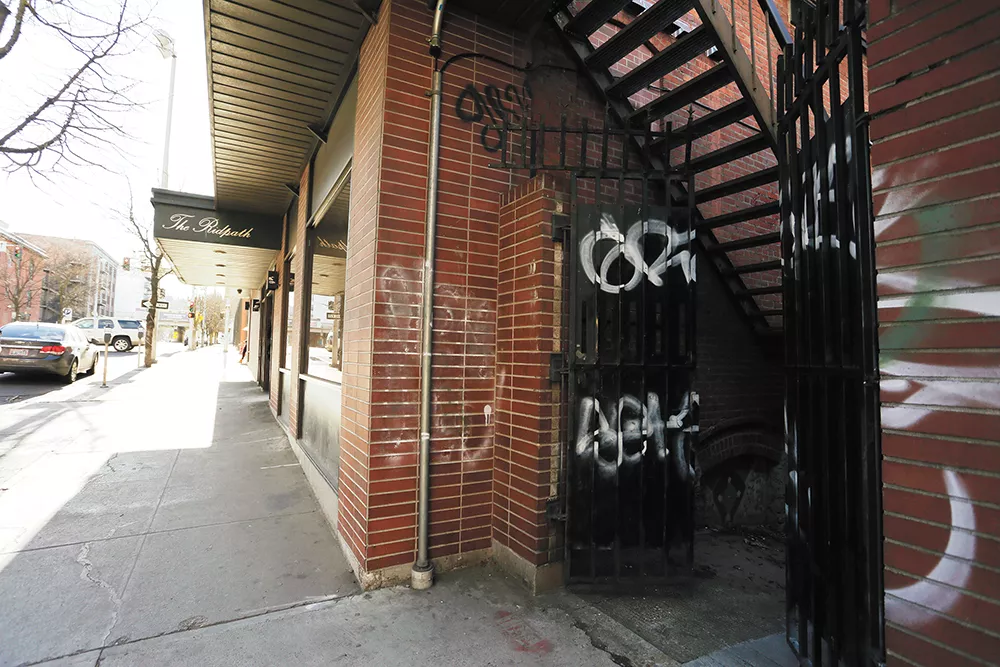
"When it's warm out, they're all out here," Lemus says, describing an incident where he was recently "accosted" by a group of loiterers while walking home. "I feel like I've got to buy a taser or something so that we don't get attacked while we're out here."
"It just makes downtown less appealing," Sicilia says of the project. "People are like, 'Wow this neighborhood sucks.' You hear a lot of comments about how bad the neighborhood is."
"The block needs something to help it grow and I think [the project] isn't helping anything," Hansen tells the Inlander. "It's really just kind of regressing, making the problem worse instead of helping it."
In addition to the dynamics on the sidewalks, tenants cite other security-related issues: One is that friends and associates of existing tenants are getting entry codes and entering the building without supervision or badgering residents to let them in — sometimes aggressively. Another is that tenant relations can be rocky, occasionally resulting in conflicts and other disturbances.
"There have been some people that are residents that have been assaulted," says Ann, the Ridpath tenant. She adds that the culprits are usually associates of tenants trying to get access to the building or tenants strung-out on various illicit drugs. "You just use your survival skills to the best of your ability and then, you know, always expect the unexpected."
Mann, the co-investor in the project, acknowledges that the situation isn't ideal. But he also says stakeholders need to be patient. "I think it will achieve our objectives. It's still in the early days yet, but this has been a blighted block for a decade and we're in the process of bringing it back to life," he says. "Clearly it hasn't happened." (The Ridpath property manager did not respond to multiple requests for comment.)
Mann also points out that the property adjacent to the Ridpath on its east side, the Halliday Building, on the corner of Sprague and Stevens, is under separate ownership and hasn't been revitalized. "That's not being renovated in any way at the moment and sometimes people look at that and think it's part of the Ridpath."
Despite the news surrounding Wells and the less-than-perky state of the block surrounding the Ridpath, city spokeswoman Marlene Feist also feels that the project is living up to the goals that warranted the $1.75 million public investment last year. "The goals of the project were to remedy the blight of this [block] in the downtown core and create more affordable housing units," she says. "There's still some work that needs to be done on the exterior for sure. But it's no longer a vacant building that people are using to illegally enter. People are not squatting in that building
Mann says that while the building has had security issues, it will soon be outfitted with a key fob system and that will "eliminate the problem" of non-tenants entering the building. He also pointed to a recent meeting between Lemus and the building's property manager to discuss the various issues. (Lemus tells the Inlander that he viewed the meeting positively and that the company is going to "get on the ball.")
Kay Murano, executive director of the Spokane Low Income Housing Consortium, says that the Ridpath's management might want to consider hiring a social worker for the property to work on tenant relations and conflict mediation — similar to staffing models employed by Catholic Charities. "With the Ridpath, it's going through those growing pains to figure out what works best," she says. (Mann says that the property has no such staff at this point.)
Tenants started moving in last spring. But way before that, in July of 2017, restaurant entrepreneur Hansen "started feeling weird" about the Ridpath and the bar and restaurant that he was trying to open in it. He points to the disturbances on the sidewalk outside and internal security issues with the building as his rationale for backing out of the project. (For example, he says his wife found evidence that people were squatting in the restaurant space last October.)
"It's the dynamic of the whole atmosphere of the building itself and what it's bringing to the block. [It] isn't really conducive to the style of restaurant that we wanted to put in there," Hansen says. "The building itself is not that secure and there's a lot of weird stuff that happens. I don't want to put myself in a situation where I could get hurt or I have to defend a guest."
Mann largely declined to comment on the specifics of Hansen's concerns. "He is moving on. We're going to look for a new tenant," he says.
But for all the hoopla over the Ridpath, tenants themselves don't hate the building or aren't desperate to move out; in their view, there are just some things that could be improved upon.
"'It's not a shithole," says one Ridpath tenant who declined to give his name. "It's a nice facility."
He adds that the property management staff are "not slumlords, for sure."
"It's just a great little community," Lemus says. "As the building continues to progress and the staff continues to work with us, I think it'll be a great thing."
Besides, Ann adds, it's not like the building's low-income tenants have other housing options. "With the housing market the way that it is? When you're low income, there is no place to go." ♦
joshk@inlander.com
CLARIFICATION: An earlier version of this story included the incorrect age of Ridpath Hotel’s main tower. While the hotel originally opened in 1900, that tower was destroyed by fire in 1950 and rebuilt by 1952. The Ridpath had been regarded as Spokane’s oldest continuously operated hotel, with its 108-year run, when it closed in 2008.

